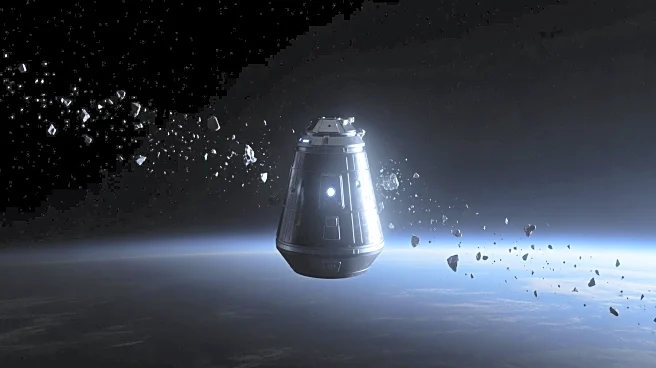What's Happening?
China's Shenzhou 20 spacecraft, part of the Tiangong space station program, experienced a suspected impact from space debris, leading to a delay in the return of its crew. The incident resulted in a cracked window on the return vessel, prompting Chinese
officials to implement an 'alternative return procedure.' The crew eventually returned to Earth using a different spacecraft, Shenzhou 21, leaving the original vehicle deemed unsafe for reentry. This event has sparked discussions among experts about the need for a space rescue capability, particularly as private-sector spaceflight grows. Advocates suggest the development of compatible docking systems and communication protocols to facilitate rescue operations in space.
Why It's Important?
The incident underscores the increasing risks posed by space debris to both governmental and private space missions. As the space industry expands, the need for robust rescue capabilities becomes more critical. The development of such systems could enhance safety for astronauts and spacefarers, potentially preventing catastrophic outcomes. Moreover, the situation highlights the importance of international cooperation in establishing standards for docking systems and rescue protocols. The growing involvement of multiple countries and companies in space exploration necessitates a coordinated approach to address these challenges, ensuring the safety and sustainability of space activities.
What's Next?
China is preparing the Shenzhou 22 spacecraft for an uncrewed mission to the Tiangong space station, originally scheduled for 2026. This incident may accelerate discussions on establishing international standards for space rescue operations. Stakeholders, including government agencies and private companies, might collaborate to develop compatible systems and procedures. The focus will likely be on enhancing communication and interoperability between different space missions, potentially leading to new policies and agreements. The global space community may also increase efforts to mitigate space debris and improve spacecraft inspection protocols.
Beyond the Headlines
The event raises ethical and legal questions about the responsibility of space-faring nations to ensure the safety of their missions and the potential impact on international relations. As space becomes more accessible, the need for a comprehensive framework to address rescue operations and debris management grows. This could lead to long-term shifts in how space missions are planned and executed, emphasizing safety and collaboration. The incident may also influence public perception of space exploration, highlighting the risks involved and the importance of developing solutions to protect astronauts and equipment.
















